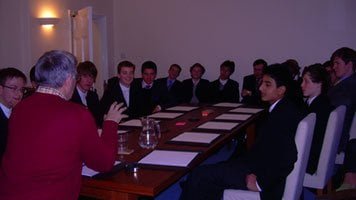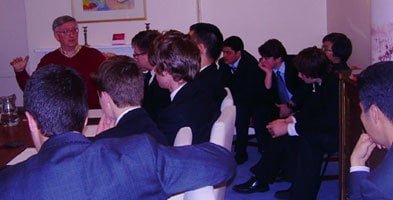 |
| Alan Woods talks to the Orwell Society |
On Tuesday, March 4, Alan Woods, the editor of Marxist.com,
spoke at Eton. For the non-British readers of Marxist.com who do not know, Eton
is the most prestigious “public” (that is, private) school in Britain, attended
by the sons of the rich and aristocratic families that have traditionally ruled
the country. One of its best-known former pupils was the famous left-wing
writer George Orwell, author of 1984, Animal Farm and Homage
to Catalonia. The Orwell Society at Eton was formed to provide a forum for
left-wing views at the school, and Alan was invited by the Society to speak on
the subject “Is Marxism still relevant today?”
The meeting was well attended, with 26 students present. The
room was full and extra chairs had to be brought in. Alan spoke for about 40
minutes and the interest of the audience was palpable. He opened by countering
the myth of the death of Marxism: “They have been saying the same thing every
year for the last 150 years. The question is: why do they bother? Why do they
continue to attack Marxism if it is really irrelevant?” Alan then went on to
describe the Communist Manifesto as “the most modern of all books” and
justified this assertion by pointing to the fact that a book written over 150
years ago was able to predict and explain the phenomenon of globalisation.
Dealing with the argument that socialism is contrary to
human nature, he said: “So-called human nature has changed many times over the
centuries and millennia. Our ancestors were cannibals and they doubtless
considered cannibalism to be a product of immutable human nature. Similarly
slavery was regarded as completely natural and inevitable. The great Aristotle
showed his genius by questioning whether slavery was moral. Nobody else even
bothered to ask the question. And even Aristotle was forced to conclude that slavery
was moral because the slaves lacked a soul and therefore were not real human
beings.
“In the same way today people think that capitalism, its
institutions and morality are something permanent. In fact, capitalism has only
existed for the last 200 years. It is a relatively recent phenomenon, which has
now outlived its historical usefulness.”
The speaker went on to expose the failings of the “free
market economy”. He pointed to the fact that in 1940, when Britain had its back
to the wall, with Hitler’s armies at the gates, the government centralised the
economy, nationalized key industries and introduced measures of planning. “Why
did they do this instead of relying on market forces? The answer is very
simple: because it got better results,” he said.
He went on to expose the hypocrisy of the talk about private
enterprise: “It is said that the entrepreneurs take risks for which they must
be rewarded. But what risks did the owners of Northern Rock run? As soon as
they ran into serious difficulties they rushed cap in hand to the state, and
Gordon Brown came running with an open chequebook to bail them out with public
money. In the USA wealthy farmers are paid huge subsidies by the state to
produce ethanol, which is driving up food prices and causing hunger worldwide.”
Alan then went on to deal with the “socialism” of the USSR:
“What failed in the USSR was not socialism in any sense understood by Marx or
Lenin but a bureaucratic and totalitarian caricature of socialism,” he
explained. However, despite the crimes of Stalin and the bureaucracy, the
Soviet Union demonstrated the colossal potential of a nationalised planned
economy: “Tsarist Russia was a poor, backward country, like Pakistan today.
Most of its people were illiterate. Yet by the 1980s, the USSR had more
scientists, engineers and technicians than the USA, Britain, Germany and Japan
together, and they were of a very high quality,” he said.
Afterwards, there was a very lively session of questions and
answers. The first question was: “Do you think that communism is inevitable?”
To this Alan replied in the affirmative, but added a warning: “Marx said that
the alternative before humanity is socialism or barbarism. That is still true
today, with the difference that if the capitalist system is allowed to continue
it will eventually signify the destruction of the environment. It is the greed
for profit that is behind the global crisis that is destroying the planet and
threatening the very existence of life on earth. The only solution is a
rational plan of production on a global scale. The alternative will be a
further decline of civilisation and culture and eventually there will be a
question mark over the survival of the human race itself.”

Another student asked whether Lenin was really a continuer
of Marx. Alan answered emphatically in the affirmative and explained that there
was nothing in common between Stalinism and Leninism. A student from Hong Kong
asked about China. Was it not the case that market economics had succeeded
there? Alan said that China had a vast potential, but that potential only began
to be realised with the Revolution of 1949. The institution of a nationalized
planned economy transformed China just as it had transformed tsarist Russia:
“Where did all these qualified Chinese workers, scientists and technicians come
from?” he asked. They are the products of a nationalized planned economy.
Alan explained that socialism in one country was impossible.
Marx and Engels explained in the Communist Manifesto that capitalism
begins by creating a national market but goes on to create a world market: “The
most important feature of the present epoch is precisely the crushing
domination of the world market. No country, no matter how big, can escape from
the pull of the world market. That was true of Russia and it is also true of
China. Mao’s idea of autarky was a reactionary utopia that seriously distorted
China’s economic development. But now the participation of China in the world
market is pulling it in the direction of capitalism.
“It is true that the participation of China in world trade
has acted as a powerful stimulus to the development of the productive forces.
China’s economy is growing at ten or eleven percent a year. But at what cost?
There are about 150 million unemployed and Chinese workers are subjected to the
most brutal exploitation in the factories. There are an appalling number of
accidents in the workplaces. There is a colossal increase in inequality both in
town and country. There are savage cuts in health and social services. The people
of China are prepared to tolerate these things temporarily because they believe
things will get better. But the introduction of capitalism in China is
preparing a serious crisis of overproduction (the economists are already
warning about “overheating”). This will have very serious effects in China in
the next period.
Another student asked about Marx’s attitude to alienation.
Alan replied that the fundamental form of alienation in capitalism is the
alienation of the worker from the wealth he or she produces. The majority are
deprived of the things they need. People’s lives are dominated by this constant
search for things that ought to be taken for granted. He quoted the words of
Aristotle: “Man begins to philosophise when the needs of life are provided.” And
he added a quote from Trotsky: “How many Aristotles are herding swine? How many
swineherds are sitting on thrones?”
He went on to explain that alienation underlies all social
existence under capitalism: “The real God in this society is not Jehovah, Buddha
or Allah. The real God is Money. In this society men and women are enslaved to
these little bits of paper. People will even kill to obtain them. A young man
will stab another youngster to possess a pair of trainers that the admen have
convinced him are essential for his existence. These are the values of
capitalist society.”
In summing up, Alan said: “I do not know whether I have
convinced you of the correctness of Marxism. But even if I have not, I hope at
least to have aroused your interest in reading and studying these ideas for
yourselves. My aim in coming here was not just to pass an entertaining evening
but to make you think for yourselves, to question the society in which we live
and to draw some conclusions. The question I want you to think about is this:
is this really the kind of world we want to live in? Is this the best that the
human race can do in the 21st century? I do not believe that it is.
“If you ask me to say what socialism really is, I will
answer thus: it is to make the human race actually what it always was
potentially. In order to do this a fundamental change in society is needed. In
place of an economy based exclusively on the profit of the few we require an
economic system based on production for the satisfaction of human needs. That
is the only rational form of society, and that is what socialism is.”
The talk was very well received by those present and
the general interest was shown by the fact that the Marxist books on sale were
immediately sold out.






